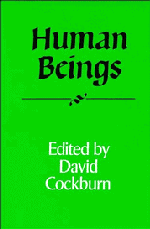Book contents
- Frontmatter
- Contents
- Introduction
- Machines as Persons?
- The Importance of Being Human
- Response to McNaughton
- Response to Diamond
- Real Selves: Persons as a Substantial Kind
- Personal Identity and Brain Transplants
- Personal Identity and the Idea of a Human Being
- Imagination and the Sense of Identity
- Radical Critique, Scepticism and Commonsense
- Getting the Subject back into the World: Heidegger's Version
- Incarnational Anthropology
- How Many Selves Make Me?
- Sartre and Our Identity as Individuals
- Bibliography
- Notes on Contributors
- Index
Response to McNaughton
Published online by Cambridge University Press: 05 February 2015
- Frontmatter
- Contents
- Introduction
- Machines as Persons?
- The Importance of Being Human
- Response to McNaughton
- Response to Diamond
- Real Selves: Persons as a Substantial Kind
- Personal Identity and Brain Transplants
- Personal Identity and the Idea of a Human Being
- Imagination and the Sense of Identity
- Radical Critique, Scepticism and Commonsense
- Getting the Subject back into the World: Heidegger's Version
- Incarnational Anthropology
- How Many Selves Make Me?
- Sartre and Our Identity as Individuals
- Bibliography
- Notes on Contributors
- Index
Summary
David McNaughton argues that in footnote 48 of my paper I provide justification for including the severely retarded among those whom we think of as with us in being human. Let me fill in the background to that note.
In the paper I write about the ways in which a sense of shared humanness may be expressed, for example in literature. At various points I use the language of human connectedness in the hope that readers will find themselves at home in what is in fact a familiar kind of language. That was my intention in writing that ‘a human being is someone who has a human life to lead, as do I, someone whose fate is a human fate, as is mine’. John Marshall was puzzled by my saying that I meant those words to apply also to severely retarded people. On his Kantian view, what is meant by the leading of a human life involves having ideas about one's life and how one might lead it, ideas that enter into what one does, what one makes of that life. So rationality is tied to a life's being human; and that led Marshall to say that someone cannot lack rationality and still be, in the morally important sense, human.
- Type
- Chapter
- Information
- Human Beings , pp. 83 - 84Publisher: Cambridge University PressPrint publication year: 1991

